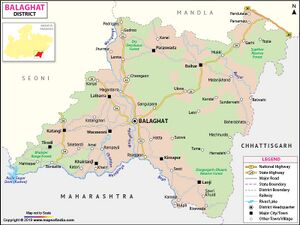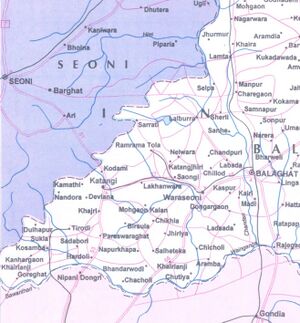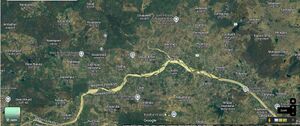Kosamba
| Author:Laxman Burdak, IFS (R) |



Kosamba (कोसंबा) is a village in Tirodi tahsil in Balaghat district of Madhya Pradesh. It is mentioned as Koshambakhanda (कोशम्बखण्ड) in Tirodi Copper Plate Inscription of the Maharaja Pravarasena II.[1]
Variants
- Kosambakhaṇḍa/ Koshambakhanda (कोशम्बखण्ड) mentioned in Tirodi Copper Plate Inscription of the Maharaja Pravarasena II.[2]
- Koshambaka (कोशम्बक)/ Koshamba (कोशम्ब) Indore Plates of 23rd year of Pravarasena II[3]
Location
Kosamba village is located in Tirodi tehsil of Balaghat district in Madhya Pradesh, India. It is situated 21km away from sub-district headquarter Tirodi and it is 65 km distance from District Head Quarter Balaghat. Nearest Statutory Town is Katangi in 15 km Distance.[4]
History
Tirodi Copper Plate Inscription of the Maharaja Pravarasena II
Tirodi Copper Plate Inscription of the Maharaja Pravarasena II [5] mention Kosamba .... The plates were issued from Narattangavari (नरत्तंगवारी) by the Vakataka Maharaja Pravarasena II. The object of record the grant of the village Koshambakhanda (कोशम्बखण्ड) to a Brahmana named Varunarya (वरूणार्य) (Of the Harkari and the Atharvaveda, who was a resident of Chandrapura (चान्द्रपुर) and was proficient in three Vedas. The donated village was bounded on the east by Jamali (जमली), on the south by Vardhamanaka (वर्धमानक), on the west by Mrigasima (मृगसिम) and on the north by Mallakapedhaka (मल्लकपेधक). (p.48)... Kosambakhanda, the donated village, is evidently Kosamba, about 6 miles to the north-east of Tirodi, where the plates were found.....Kosamba, which now represents ancient Koshambakhanda, is only 20 miles from the Wainganga, and was evidently included in the western division (apara-patta) of Bennakata. (p.49)
Indore Plates of 23rd year of Pravarasena II
Indore Plates of 23rd year of Pravarasena II[6] may have been issued from the royal capital Pravarapura. The object of the present inscription was to record the grant of a village (the name of which is unfortunately lost owing to the writer’s carelessness) which lay in the mārga of Gepuraka (गेपुरक), to the north of Aramaka (आरामक), to the east of Kobidarika (कोबिदारिका) to the south of Koshambaka (कोशम्बक) and to the west of Anjanavataka (अंजनवाटक). (p.39)
As no definite information is available about the original findspot of the present plates, it is not easy to locate the places mentioned in them; and none have been identified so far. After a good deal of search for them, I have been able to find some of them in the respective directions in the Balaghat District of Madhya Pradesh.
Koshamba (कोशम्ब) which lay to the north of the donated village is probably identical with Koshambakhanda which Pravarasena II granted by his Tirodi plates. As shown elsewhere, the latter is identical with Kosamba, 6 miles to the south of Tirodi.
Anjanavataka (अंजनवाटक) which defined the eastern boundary of the donated village is probably Anjanwadi (अंजनवाड़ी), about 5 miles to the south-east of Kosamba.
Kobidarika (कोबिदारिका) which lay to the west of the donated village may be Kunargaon, 4 miles south by west of Kosamba.
These three villages thus lie in the same directions as those stated in the present grant.
Gepuraka (गेपुरक) and Aramaka (आरामक) cannot, however, be found in the neighbourhood of these villages. If these identifications are correct, the grant may have originally belonged to the Balaghat District. (p.40)
Notable persons
Gallery
Population
External links
References
- ↑ Corpus Inscriptionum Indicarum Vol.5 (inscriptions Of The Vakatakas), pp.48-52
- ↑ Corpus Inscriptionum Indicarum Vol.5 (inscriptions Of The Vakatakas), pp.48-52
- ↑ Corpus Inscriptionum Indicarum Vol.5 (inscriptions of The Vakatakas), Edited by Vasudev Vishnu Mirashi, 1963, Archaeological Survey of India, p.38-42
- ↑ https://www.onefivenine.com/india/census/village/Balaghat/Tirodi/Kosamba#google_vignette
- ↑ Corpus Inscriptionum Indicarum Vol.5 (inscriptions Of The Vakatakas), pp.48-52
- ↑ Corpus Inscriptionum Indicarum Vol.5 (inscriptions of The Vakatakas), Edited by Vasudev Vishnu Mirashi, 1963, Archaeological Survey of India, p.38-42

